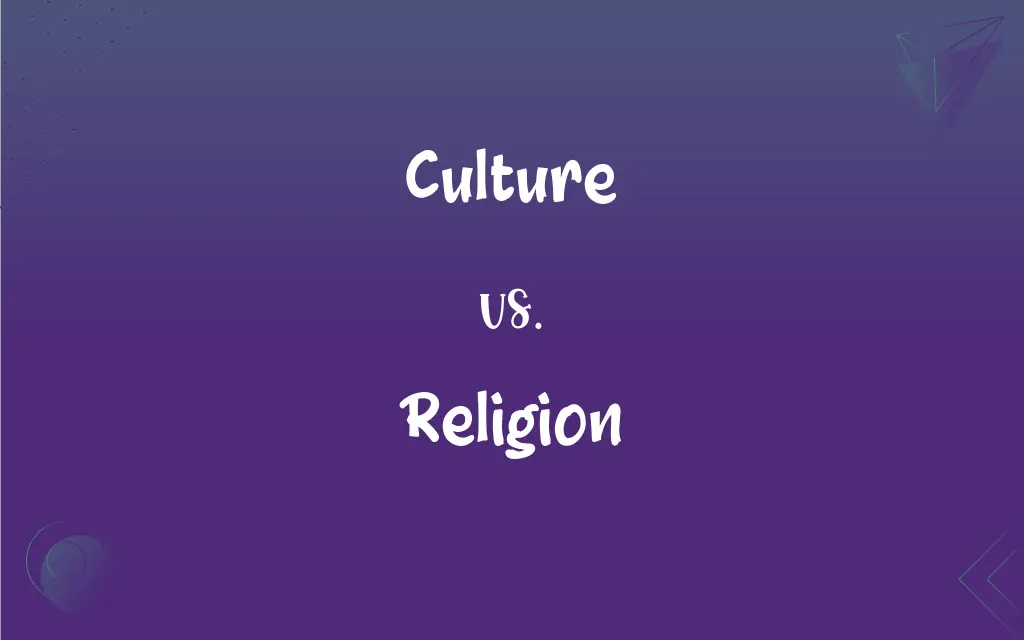Culture vs. Religion: What's the Difference?
Edited by Janet White || By Harlon Moss || Updated on June 5, 2024
Culture encompasses shared patterns of behaviors and interactions, while religion is a specific set of organized beliefs and practices, usually involving a higher power or deity.

Key Differences
Culture and religion, while often intertwined, harbor unique distinctions that render them independently significant. Culture encompasses the shared behaviors, values, symbols, arts, and social norms of a group or society. In stark contrast, religion specifically pertains to organized systems of beliefs, practices, and worship, primarily revolving around a higher power or deity. Culture broadly captures the lifestyle and practices of a group, providing a collective identity, while religion provides a structured methodology for spirituality and moral guidelines.
A vital distinction to emphasize between culture and religion involves the scope of their influence. Culture is a more overarching term that includes various aspects, such as language, cuisine, social habits, music, and arts. Religion, on the other hand, focuses on particular practices, rituals, and doctrines intended to facilitate spiritual development. Culture is learned and passed down from generation to generation through socialization and education, while religion is often disseminated through teachings, rituals, and sacred texts.
The interaction between culture and religion is undeniably complex and multifaceted. Culture can profoundly influence religious practices and interpretations, determining how religious beliefs are expressed and celebrated. Conversely, religion can significantly influence culture, shaping moral values, laws, and traditions within a society. Thus, while distinct, the interplay between culture and religion often forms a symbiotic relationship, each impacting and shaping the other in various contexts.
Viewed temporally, culture and religion exhibit divergent adaptability and evolutionary patterns. Culture tends to evolve and adapt relatively quickly, absorbing influences from various sources and adjusting to changes in society and environment. In contrast, religion often adheres strictly to established doctrines and practices, potentially exhibiting slower adaptation to societal shifts and maintaining a consistency across time and geography. This dynamic is essential to comprehend, recognizing that culture and religion can exist symbiotically yet adapt differently to temporal shifts.
It is pivotal to understand that while culture can exist without religion, religion is generally embedded within a cultural context. Culture exists in various forms globally, encapsulating the diverse ways groups live, interact, and understand their world, independently of religious affiliations. In contrast, religion typically exists within the framework of culture, its practices, and beliefs often molded by the cultural context in which it resides. Hence, culture provides a broad framework for living, while religion offers a specific pathway to understanding spirituality and morality within that framework.
ADVERTISEMENT
Comparison Chart
Definition
Shared patterns of behaviors and interactions
Beliefs and practices around a deity
Scope
Encompasses language, art, norms, and values
Focused on worship, doctrine, and spirituality
Influence and Interaction
Can exist without religion
Typically exists within a cultural context
Adaptability
Tends to evolve and adapt quickly
Often adheres to established doctrines
Context
Provides a general framework for life and living
Provides specific spiritual and moral pathways
ADVERTISEMENT
Culture and Religion Definitions
Culture
Culture embodies shared social behaviors and norms.
The culture of the community was enriched by various traditional festivities.
Religion
Religion involves beliefs in a higher power or deity.
Religion often provides individuals with spiritual guidance and community.
Culture
Culture involves collective values and beliefs.
The emphasis on family unity is deeply rooted in our culture.
Religion
Religion encompasses specific rituals and practices.
Lighting candles is a practice observed in some religion during worship.
Culture
Culture is transmitted through socialization and education.
Through storytelling, elders passed down the culture to younger generations.
Religion
Religion provides a moral and ethical framework.
His religion encourages altruism and kindness towards others.
Culture
Culture reflects the lifestyle and practices of a group or society.
The indigenous culture emphasizes harmony with nature.
Religion
Religion often involves worship in specific places.
Every week, they attend a service at a place designated by their religion.
Culture
Culture includes art, music, and symbolic expressions.
Music festivals are vibrant expressions of local culture.
Religion
Religion may be guided by sacred texts or doctrines.
The doctrines of her religion advocate for peace and understanding among all.
Culture
The arts, beliefs, customs, institutions, and other products of human work and thought considered as a unit, especially with regard to a particular time or social group
Edwardian culture.
Japanese culture.
Religion
The belief in and reverence for a supernatural power or powers, regarded as creating and governing the universe
Respect for religion.
Culture
These arts, beliefs, and other products considered with respect to a particular subject or mode of expression
Musical culture.
Oral culture.
Religion
A particular variety of such belief, especially when organized into a system of doctrine and practice
The world's many religions.
Culture
The set of predominating attitudes and behavior that characterize a group or organization
A manager who changed the corporate culture.
Religion
A set of beliefs, values, and practices based on the teachings of a spiritual leader.
Culture
Mental refinement and sophisticated taste resulting from the appreciation of the arts and sciences
A woman of great culture.
Religion
The life or condition of a person in a religious order
A widow who went into religion and became a nun.
FAQs
Is religion always embedded in culture?
While religion can exist independently, it is often embedded within and influenced by cultural contexts.
What does culture encompass?
Culture encompasses shared behaviors, values, norms, arts, and social traditions within a group or society.
Are religious practices static or adaptive?
Religious practices can be both static, adhering to traditional doctrines, and adaptive, evolving in response to contextual needs.
Can an individual convert to a different religion?
Yes, individuals can convert to different religions, often through processes defined by the respective religious doctrines.
Can religion coexist with scientific beliefs?
Religion and science can coexist, with many individuals navigating their religious beliefs alongside scientific understanding.
How does culture relate to tradition?
Traditions are aspects of culture that are passed down through generations, reflecting shared practices and beliefs.
What is religion characterized by?
Religion is characterized by organized systems of beliefs, practices, and worship, often centered around a deity.
How does culture influence social behaviors?
Culture influences social behaviors by shaping norms, values, and practices that guide interactions within a group.
Does culture influence culinary practices?
Absolutely, culture deeply influences culinary practices, determining dietary habits, cooking methods, and traditional dishes.
Is language a part of culture?
Yes, language is a crucial component of culture, facilitating communication and expressing shared meanings and values.
Is religion confined to specific geographic regions?
Religions may originate in specific regions but often spread, becoming practiced in various geographic and cultural contexts.
How is culture transmitted across generations?
Culture is transmitted through socialization, education, traditions, and often, through storytelling and rituals.
Can individuals practice multiple religions?
Yes, some individuals practice syncretism, blending elements from multiple religions in their spiritual practices.
How does culture influence identity?
Culture shapes identity by providing shared norms, values, and contexts that individuals identify with and belong to.
Can culture exist without religion?
Yes, culture can exist without religion, providing a framework for social behaviors, norms, and values independently.
Do all religions worship a deity?
While many religions worship a deity or deities, some religions, like Buddhism, do not centralize worship around a god.
Can religion impact daily life and routines?
Yes, religion can profoundly impact daily life, influencing routines, behaviors, and interactions based on religious beliefs.
Can culture influence legal systems?
Yes, culture can significantly influence legal systems, shaping laws and judicial practices in alignment with cultural values.
How does religion influence moral values?
Religion often provides moral and ethical frameworks, guiding individuals toward specific moral and ethical behaviors.
Can culture adapt and change?
Yes, culture can adapt and evolve, often assimilating new influences and adjusting to changes within society.
About Author
Written by
Harlon MossHarlon is a seasoned quality moderator and accomplished content writer for Difference Wiki. An alumnus of the prestigious University of California, he earned his degree in Computer Science. Leveraging his academic background, Harlon brings a meticulous and informed perspective to his work, ensuring content accuracy and excellence.
Edited by
Janet WhiteJanet White has been an esteemed writer and blogger for Difference Wiki. Holding a Master's degree in Science and Medical Journalism from the prestigious Boston University, she has consistently demonstrated her expertise and passion for her field. When she's not immersed in her work, Janet relishes her time exercising, delving into a good book, and cherishing moments with friends and family.































































